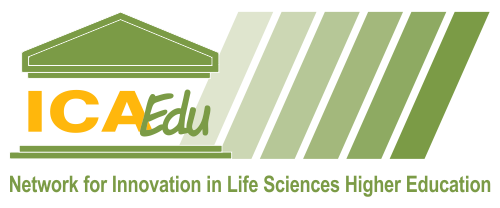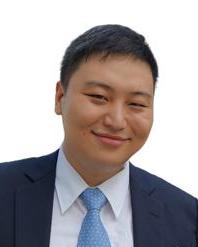
Life Sciences university education in the future –
incorporating the benefits and challenges of generative AI in delivering
the learning outcomes
was held online on Wednesday 8 October 2025 from 9.30 to 12.30 CET
See the presentations and the recordings of the presenttaions by the keynotes
A Outline
This workshop explores the evolving landscape of university education in the life sciences, focusing on how generative AI can support or challenge the achievement of learning outcomes. As AI tools become increasingly integrated into academic environments, educators are required to assess their pedagogical value, ethical implications, and impact on student engagement and assessment. The workshop will provide a platform for dialogue, sharing strategies to harness AI’s benefits — such as personalised learning and content generation — while addressing challenges like academic integrity and equity. Participants will consider how future life science curricula can responsibly and effectively integrate generative AI to enhance educational outcomes and to provide the types of AI literate skills that are required in the workplace.
B Programme
9.30 Welcome and introduction to the Workshop. Mieke Uyttendaele - Chair ICA-Edu & Faculty Director of Education & Internationalisation, Faculty of Bioscience Engineering, University of Ghent, BE
9.40 Keynote 1: Using generative AI for data analysis and scientific writing.
Ioannis N. Athanasiadis, Chair of Artificial Intelligence, Wageningen University and Research, NL. View the recording
10.20 Two short interventions as examples of “Generative AI curricular intervention in delivering learning outcomes”
| AI curricular intervention at Graz University of Technology, Martin Ebner, Department Educational Technology, Graz University of Technology, Graz, AT. View the recording |
|
| Using generative AI for data analysis and scientific writing. Elżbieta Wójcik-Gront, Department of Biometry, Institute of Agriculture, Warsaw University of Life Sciences, PL. View the recording |
10.50 Break-out groups with set questions
11.20 Grab a coffee before Keynote 2
11.30 Keynote 2: Universities as catalysts for change: how AI amplifies Education for Sustainable Development (ESD),
Tianchong (Alex) Wang, College of Education, Psychology and Social Work, Flinders University, Australia. View the recording
12.10 Panel discussion with questions
12.30 Close
C Keynote Abstracts and Bios
Ioannis N. Athanasiadis
Abstract
As the job market continues to evolve, it's essential to integrate AI knowledge and skills into educational curricula to equip students with the necessary tools for success. By incorporating AI-driven learning, critical thinking, and problem-solving skills, educators can help students develop a strong foundation for the workforce. This talk will explore the benefits of AI-infused education, strategies for effective integration, and real-world applications to prepare students for the dynamic and rapidly changing job market.
Bio Ioannis N. Athanasiadis is Professor and Chair of Artificial Intelligence at Wageningen University and Research. His research aims to advance artificial intelligence to address global challenges, related to food security, agriculture and ecology. He is a proponent of use-inspired fundamental research. Driven by the complexities of natural systems, Ioannis aspires to further the field of artificial intelligence and contribute towards a more sustainable and food-secure future. Together with his research team, students and stakeholders, Ioannis develops artificial intelligence systems tailored to help farmers, policymakers, and stakeholders make better-informed decisions, manage risks and improve our understanding of complex system interactions with data-driven discoveries.
Ioannis N. Athanasiadis is Professor and Chair of Artificial Intelligence at Wageningen University and Research. His research aims to advance artificial intelligence to address global challenges, related to food security, agriculture and ecology. He is a proponent of use-inspired fundamental research. Driven by the complexities of natural systems, Ioannis aspires to further the field of artificial intelligence and contribute towards a more sustainable and food-secure future. Together with his research team, students and stakeholders, Ioannis develops artificial intelligence systems tailored to help farmers, policymakers, and stakeholders make better-informed decisions, manage risks and improve our understanding of complex system interactions with data-driven discoveries.
See his full bio here
Martin Ebner
Abstract:
Graz University of Technology is attempting to take a very proactive approach to artificial intelligence integration and therefore to incorporate it sufficiently into its courses, curricula or educational activities. A distinction can be made between low-level measures (MOOC, web applications), integration into teaching (projects) and high-level initiatives (supplementary studies). These will be briefly presented and discussed in the presentation.
Bio: Martin Ebner is an internationally recognised expert in educational technology and technology-enhanced learning. Since 2016, he has served as the Head of the Department of Educational Technology at Graz University of Technology, where he has played a pivotal role in advancing research and development in this field. In 2024, he was appointed Dean of Study for Teacher Education at the same institution.
Martin Ebner is an internationally recognised expert in educational technology and technology-enhanced learning. Since 2016, he has served as the Head of the Department of Educational Technology at Graz University of Technology, where he has played a pivotal role in advancing research and development in this field. In 2024, he was appointed Dean of Study for Teacher Education at the same institution.
With a strong academic foundation, Martin has been an Adjunct Professor of Media Informatics and Senior Researcher in the Department of Human-Centred Computing at Graz University of Technology since 2010. His research focuses on transformative areas such as Technology Enhanced Learning, Digital Literacy for Higher Education, Mobile and Seamless Learning, Massive Open Online Courses (MOOCs), Open Educational Resources (OER), and the application of AI and Learning Analytics in primary, secondary, and higher education.
Martin’s work has significantly shaped the global discourse on educational technologies, contributing to innovative strategies and tools for modern teaching and learning environments. Find more information here:
Tianchong Wang
Abstract::
As environmental crises intensify and social inequities widen, universities face unprecedented demands to advance Education for Sustainable Development (ESD). Yet traditional educational approaches may no longer be sufficient to meet the scale and urgency of preparing students for these complex challenges. Artificial intelligence (AI) is emerging as a transformative force in higher education, offering remarkable possibilities to revolutionize how universities deliver ESD programs, conduct sustainability research, and model sustainable practices. From personalized learning pathways that develop essential sustainability competencies to sophisticated simulation environments that enable students to explore complex decision-making scenarios, AI presents opportunities to fundamentally reimagine sustainability education. This keynote explores how universities can harness AI to create more effective, engaging, and impactful ESD initiatives. Through examples drawn from diverse educational contexts and innovative pedagogical approaches, we will examine both the extraordinary potential and the critical ethical considerations that shape responsible AI adoption in sustainability education. How can universities leverage these powerful technologies while ensuring equity, transparency, and environmental responsibility in their ESD programs? What does the future of sustainability education look like when enhanced by artificial intelligence? Join us to explore these vital questions and discover how AI might transform the very role universities play in educating tomorrow's sustainability leaders.
Bio: Dr Tianchong Wang (Alex) is a Lecturer in STEM in Innovative Education Futures at Flinders University's College of Education, Psychology and Social Work. He holds an EdD from the Chinese University of Hong Kong, an MSc from the University of Hong Kong, and a BA from Hong Kong Baptist University, along with various ICT qualifications.
Dr Tianchong Wang (Alex) is a Lecturer in STEM in Innovative Education Futures at Flinders University's College of Education, Psychology and Social Work. He holds an EdD from the Chinese University of Hong Kong, an MSc from the University of Hong Kong, and a BA from Hong Kong Baptist University, along with various ICT qualifications.
As a highly cited researcher with over 1600 citations and an h-index of 19, Tianchong's work centres on technology-enhanced learning and teaching, with a particular focus on Artificial Intelligence (AI) in Education. An advocate for the UN's SDG4, his research aims to enhance education equity, quality, and inclusiveness, foster positive change in learning environments, and empower educators and learners in underprivileged communities. He currently serves as an Associate Editor of Education and Information Technologies, an Q1 SSCI journal.
Before joining Flinders, Tianchong was a Lecturer at Swinburne University of Technology and a post-doctoral fellow at the Education University of Hong Kong. He developed and taught Hong Kong's first master-level course on AI in Education at the University of Hong Kong in 2020.
Elżbieta Wójcik-Gront
Abstract:
This intervention draws on a case study at the Warsaw University of Life Sciences (SGGW), where generative AI tools were incorporated into a course on artificial intelligence in agriculture. As part of the course, students used AI platforms to analyse experimental datasets and to draft scientific reports. The exercise not only supported data interpretation and academic writing but also strengthened digital literacy and encouraged students to question and reflect critically on AI-generated outputs. The experience illustrates both the potential benefits and the practical challenges of such an approach, offering useful lessons for the responsible integration of generative AI into life sciences education.
Bio:  Elżbieta Wójcik-Gront is an associate professor and head of the Department of Biometry at the Warsaw University of Life Sciences (SGGW). With a background in nuclear physics and experience in statistical modeling, her research focuses on biometry, agronomy, and modeling greenhouse gas emissions in agricultural systems. She has collaborated on international projects in Hungary and with institutions in Europe and the USA.
Elżbieta Wójcik-Gront is an associate professor and head of the Department of Biometry at the Warsaw University of Life Sciences (SGGW). With a background in nuclear physics and experience in statistical modeling, her research focuses on biometry, agronomy, and modeling greenhouse gas emissions in agricultural systems. She has collaborated on international projects in Hungary and with institutions in Europe and the USA.
D Organising Committee
Julian Park - Chair ICA-Edu Workshop Organising Committee, & Former Pro-Vice Chancellor Education and Student Experience, Professor of Agricultural Systems, University of Reading, UK
Mieke Uyttendaele - Chair ICA-Edu & Faculty Director of Education & Internationalisation, Faculty of Bioscience Engineering, University of Ghent, BE
Stefano Cesco - Former Dean, Faculty of Science and Technology, Free University of Bozen-Bolzano, IT
Kristina Kljak – Former Vice Dean for International and Interinstitutional Cooperation, Faculty of Agriculture, University of Zagreb, HR
Marta Mendel - Vice Rector for International Co-operation, Warsaw University of Life Sciences, PL
Andreas Zitek - Chair of the ICA-Edu Special Interest Group (SIG) for Sustainable Entrepreneurship Education & Centre for Education, BOKU University, Vienna, AT
Simon Heath - ICA Deputy Secretary General
